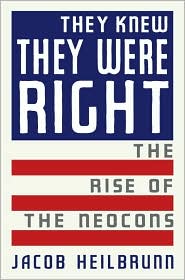As Barack Obama prepares to take the inaugural oath, it almost seems otiose to note that his victory represents a sweeping repudiation of the neoconservative movement. Though neocons such as Randy Scheunemann formed a kind of Praetorian Guard around John McCain during his presidential campaign, their truculent approach to foreign affairs sabotaged rather than strengthened McCain’s electoral appeal. The best that Sarah Palin, a foreign-policy neocon on training wheels, could do was to offer platitudes about standing by Israel. It seems safe to say, then, that the neocon credo is ready to be put out to pasture.
 Or is it? One problem with this line of argument is that it’s been heard before – sometimes from the neoconservatives themselves. In 1988, after George H.W. Bush replaced Ronald Reagan, neocon lioness Midge Decter fretted, “are we a long, sour marriage held together for the kids and now facing an empty nest?” Then in the late 1990s, Norman Podhoretz delivered a valedictory for neoconservatism at the American Enterprise Institute. Neoconservatism, he announced, was a victim of its success. It no longer represented anything unique because the GOP had so thoroughly assimilated its doctrines. In 2004, a variety of commentators scrambled to pronounce a fresh obituary for neoconservatism. The disastrous course of the Iraq War, Foreign Policy editor Moisés Naím said, showed that the neoconservative dream had expired in the sands of Araby.
Or is it? One problem with this line of argument is that it’s been heard before – sometimes from the neoconservatives themselves. In 1988, after George H.W. Bush replaced Ronald Reagan, neocon lioness Midge Decter fretted, “are we a long, sour marriage held together for the kids and now facing an empty nest?” Then in the late 1990s, Norman Podhoretz delivered a valedictory for neoconservatism at the American Enterprise Institute. Neoconservatism, he announced, was a victim of its success. It no longer represented anything unique because the GOP had so thoroughly assimilated its doctrines. In 2004, a variety of commentators scrambled to pronounce a fresh obituary for neoconservatism. The disastrous course of the Iraq War, Foreign Policy editor Moisés Naím said, showed that the neoconservative dream had expired in the sands of Araby.
Yet the neocons show few signs of going away. The Iraq surge was devised by Frederick Kagan of the American Enterprise Institute and spearheaded by William Luti, a protégé of Newt Gingrich and Dick Cheney who is currently at the National Security Council. Its success has prompted some neocons to claim vindication for the Iraq War overall. Nor has the network of institutions that the neocons rely upon melted away, from the Hudson Institute, where Scooter Libby and Douglas J. Feith are now ensconced, to the Weekly Standard and Fox News.
It’s also the case that the realists inside the GOP feel more embattled than ever. Sen. Chuck Hagel has pretty much resigned from the GOP itself as well as from his Senate seat, denouncing Rush Limbaugh and others as retrograde conservatives. What’s more, former national security adviser Brent Scowcroft, who has co-authored a new book with Zbigniew Brzezinski about the challenges facing the next president, has been informally advising Obama. Scowcroft told CNN, “I think we developed in the Republican Party a – well, you know, the buzzword for it is ‘neoconism.’ But I think what it is, it’s an ideology – it’s really an idealistic approach to things. But it’s a combination of idealism and, if you will, brute force.” As Scowcroft sees it, the neocons remain in control of the GOP. “Where do I go?” he recently asked me.
December 27, 2008
Jacob Heilbrunn, whose book They Knew They Were Right: The Rise of the Neocons has just appeared in paperback, is a senior editor at The National Interest.



